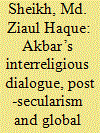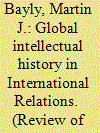| Srl | Item |
| 1 |
ID:
157616


|
|
|
|
|
| Summary/Abstract |
Samuel Moyn and Andrew Sartori depict a conceptual map of a range of
possible approaches and ways in which Global Intellectual History (GIH) can
be formulated as an academic discipline. Various scholars from different fields
propose to widen its scope and boundaries - from trans-local and westerncentric
to intra-regional, trans-continental, trans-national and even beyond the
geographical designation. In this writing, an attempt has been made to bring the
idea of “Suhl-i-kul”, a state sponsored ‘interreligious-dialogue’ initiated by Akbar
(1556-1605), a mediaeval Mughal emperor of India, as a content of GIH. This
study assumes that the concept of “Suhl-i-kul” can be matched with the idea of
‘post-secularism’ which demands that such concept can create a trans-religious
global formation and contribute to establish a peaceful society in a religiously
pluralist world, especially from the perspective of multi-religious South Asia.
|
|
|
|
|
|
|
|
|
|
|
|
|
|
|
|
| 2 |
ID:
192315


|
|
|
|
|
| Summary/Abstract |
The Eurocentric critique of the International Relations discipline has brought welcome attention to non-European international thinkers, and anti-colonial or anti-imperial thinkers in particular. Frequently these thinkers and associated movements are rightly described in thematic terms of emancipation, equality, and justice, in opposition to the hierarchical worldview of empires and their acolytes. Notwithstanding the broad validity of this depiction, a purely oppositional picture risks obscuring those aspects of ‘non-European’ international thought that evade simple categorisation. Drawing upon archival material and historical works, this article applies approaches offered by global intellectual history to the works of late colonial Indian international thinkers, exploring the mixed registers of equality and hierarchy, internationalism and imperialism present in their writings. Concentrating on three ‘sites’ connected by the common themes of diaspora and mobility: the plight of Indians overseas in East Africa; the concept of ‘greater India’; and the international political thought of Benoy Kumar Sarkar, the article complicates the internationalism/imperialism divide of the early twentieth century, showing how ostensibly opposed scholarly communities sometimes competed over similar forms of knowledge and ways of ordering the world. This offers a framework by which the contributions of global intellectual history can be applied to the study of international political thought.
|
|
|
|
|
|
|
|
|
|
|
|
|
|
|
|